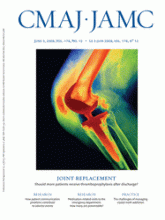- © 2008 Canadian Medical Association
DNA discrimination: Health insurers or employers will be prohibited, under legislation passes by the United States Senate in April 2008, from using DNA testing to deny people medical coverage or jobs because of a genetic disposition to a disease. The Genetic Information Nondiscrimination Act would also ban insurers from raising premiums for genetic flaws, but would allow insurers to adjust premiums or determine eligibility based on actual presence of disease.
Evenings and weekends: One in 4 emergency-department visits to Ontario hospitals in 2005/06 were made by children under the age of 17, according to the Canada Institute for Health Information. Over 1 million visits were made by approximately 685 000 children, with 1 in 15 returning to the emergency department within 72 hours of their initial visit, and 1 in 3 making more than 1 visit per year. The heaviest users were newborns and babies under the age of 1, who accounted for 802 visits per 1000 population, with 43% making repeat visits. Children between the ages of 1 and 4 accounted for 596 visits per 1000 population. Children most commonly visited emergency departments on Sundays or between 7 and 8 pm weekdays.
Itsy-bitsy spiders: Australian health authorities ordered the evacuation of Baralaba Hospital in the Banana Shire region of the state of Queensland after the facility was invaded by a horde of venomous redback spiders. The spiders, 2 to 4 cm long, are extremely common in Australia. Their bites cause severe pain and muscle spasms but no deaths since the 1950s, when an anti-venom was developed.
Pesticide ban: Ontario has become the second province to officially ban the so-called “cosmetic use” of pest control products on residential lawns, gardens and parks. The ban “on over 300 toxic products goes far beyond Quebec's ban and is quite extraordinary,” said Gideon Forman, executive director of the Canadian Association of Physicians for the Environment (CAPE). “Ultimately, though, CAPE would like to see the government issue a ‚whitelist' of permissible non-toxic substances, while placing a ban on all toxic lawn chemicals. A blacklist can go out of date and leaves room for the use of new poisons that are not explicitly prohibited.”
Photo by: Photos.com
Holistic database: The Canadian Interdisciplinary Network for Complementary and Alternative Medicine Research has established an “Outcomes Database” (www.outcomesdatabase.org) to disseminate data about complementary and alternative medicine therapies within a framework of 7 so-called domains: “physical, psychological, spiritual, social, health-related quality of life, holistic and individualized.”
An even dozen: The University of Manitoba will launch the nation's first non-military physician assistant (CMAJ 2007;177[5]:177) program in September. Up to 12 candidates will be accepted for the 2-year, full-time graduate-level program, which will lead to a Master of Physician Assistant Studies.












